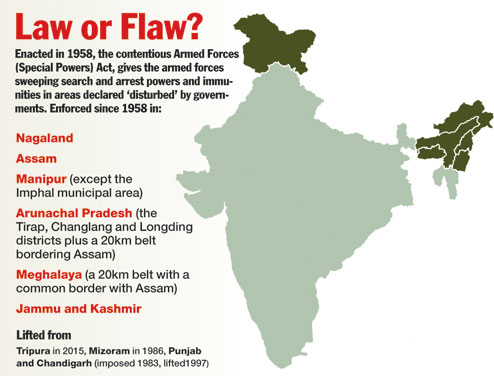Armed Forces Special Powers Act (AFSPA)
Afspa, which was enacted in 1958 amid the nascent Naga insurgency, gives powers to the army and state and central police forces to shoot to kill, search houses and destroy any property that is “likely” to be used by insurgents in areas declared as “disturbed” by the home ministry.
- Grants extra-ordinary powers and immunity to the armed forces to bring back order in the disturbed areas
- Fire upon anyone after giving warning who is acting against law & order
- Arrest anyone without warrant.
- Stop and search any vehicle or vessel.
- Armed forces personnel have legal immunity for their actions.
- Enforced in the 6 states of North East and J&K. Tripura recently decided to lift this act
Against AFSPA
- Allegations of misuse of power – fake encounters and sexual assault
- Suspension of fundamental rights and liberties guaranteed to the citizens – weakens democracy
- failed in its objective of restoring normalcy in disturbed areas although being in existence for about 50 years
- Justice Verma Committee and Reddy Committee have recommended removal of absolute immunity under AFSPA
For AFSPA
- Essential for the armed forces to function effectively in insurgency and militancy affected areas
- Played a crucial role in maintaining law and order in disturbed areas, thus protecting sovereignty and security of the nation
- Hundreds of armed forces personnel loss their lives every year at the hands of insurgents and militants. It is crucial to empower them. Withdrawal would result in poor morale
Way Forward
- terms like “disturbed”, “dangerous” and “land forces” need to be amplified to ensure greater clarity
- Proactive feedback to petitioners on action taken by the government in past human rights cases
- Protection for the armed forces must be accompanied by provisions that ensure responsibility and accountability, within the parameters of law



